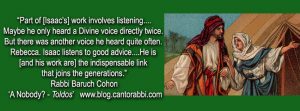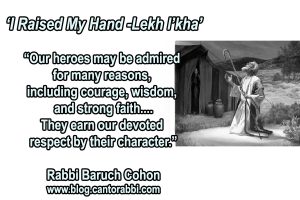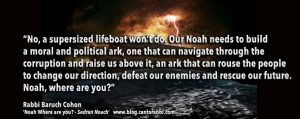
SOME GREAT EXAMPLES – Vayera –Gen.18-22, by Rabbi Baruch Cohon
Laughter and lies, hospitality and holy terror – all these themes figure in this week’s Torah reading. And all of them combine in the character of our father Abraham and in his influence on his family. Our family.
First comes hospitality. Abraham is seated outside his tent in the heat of the day, and he gets a visit from three strangers – three Divine messengers. Why this surprise visit? It provided the example of doing the right thing: carrying out the responsibility to visit the sick. And why was Abraham sick? Rashi quotes the Talmudic sage Rabbi Hama bar Hanina: “It was just three days after experiencing the world’s first bris –first ritual circumcision – and he was still in pain. So the Holy [messengers] came to express concern about his health.” Bikkur kholim – visiting the sick – is indeed a sacred responsibility, a mitvah,in Jewish life to this day. In fact we have whole societies and institutions by that name. When someone is ailing, the least we can do is show our concern.
And where does the hospitality come in? Abraham sat outside his tent in the hot sun because he was looking for weary travelers, to offer them shelter. Hospitality ranks with care for the sick as a mitzvah. The Mishna Peyah tells us that these actions – hospitality for wayfarers and visiting the sick – are two of the ten things we can do that bear fruit in this world, while their principal value extends to the next world as well. They are not just two of the 613 commandments received on Mount Sinai, but long before that, home hospitality and visiting the sick formed part of Abraham’s personality.
Now stand by for some laughter. After dignifying Abraham by accepting his hospitality, the head messenger asks:
“Where is Sarah your wife?”
“She is here in the tent.”
“I will return at the proper time (literally “the time of life” – that is, 9 months) and Sarah will have a son.”
Well, Sarah doesn’t miss a word. She is right behind them in the entrance to the tent. Hearing the prediction, she laughs silently. After all, she is pushing 90, and as the Torah tells us “Sarah no longer had the way of women,” in other words, no period for a long time now. Already in last week’s reading Abraham also got the promise of a son by Sarah and it struck some laughter out loud from him, since he was 99 and recovering from his self-inflicted circumcision, and could hardly accept the idea of becoming a new father.
The Heavenly guest doesn’t bring up the subject directly with Sarah, but he asks Abraham: “Why did Sarah laugh? … Is anything too hard for G-d?” At which Sarah speaks up – with a deliberate lie, because she is afraid:
“I didn’t laugh!”
“Lo, kee tzakhakt – No, you did laugh.”
The word for laughter is unmistakable. Like other Hebrew words it is based on a 3-letter root: tzadik, khet, kuf – pronounced tzakhak. It becomes part of the name of the son neither parent expects, Isaac – Yitzkhak. Literally, “he will laugh.” We will learn more about this long-awaited son in future chapters. His name, ever since then a name borne by countless Jewish men, still echoes his parents’ laughter. Throughout our long history it has been well observed that our sense of humor helped us survive. Ever since Abraham.
But this reading doesn’t stop with laughter. Here we will read of holy terror, in two different stories. First comes the destruction of Sodom and Gomorrah. When Abraham gets the Divine message that these evil cities will be wiped out, he resorts to a skill that some of his descendants became noted for: BARGAINING.
Yes, bargaining. We know about that. Sometimes we buy an article and then we wonder if we paid too much. Maybe we hear from friends about how they made a better deal for the same thing. The American one-price store isn’t always really one price. And when it comes to buying a house or a car, bargaining is built into the process. Then we elevate it. We don’t call it bargaining any more. We call it negotiating.
The original negotiator was none other than our father Abraham. Several times in his career we find him striking a deal with one neighbor or another. Last week he and his nephew Lot had to divide grazing lands. And this week his negotiating partner is none other than the Ribbono shel Olom – the Master of the Universe. What monumental Hutzpah! Abraham bargains with G-d.
First, Abraham listens to the Divine plan: Sodom and Gomorrah are cities filled with evil. “The men of Sodom were evil and shameful,” which Rashi explains refers to two things: they were evil with their bodies, and sinful with their money. Specifically, their physical behavior was perverted – after all, where does the word Sodomy come from? – and they supported economic corruption: they punished acts of charity and they rewarded cheaters. Physical depravity and economic venality. Totally rotten, they deserved to be destroyed.
Now Abraham replies with all the deep respect of a believer, coupled with the calm skill of a seasoned business man. He asks: “Will the Judge of all the world not do justly?” You really mean to destroy the whole city – even if there are righteous people there? And “righteous” is a relative term. If someone lives in Sodom whose physical behavior is clean and normal, and whose business practices are honest, that qualifies him as righteous. Not a scholar, not a philanthropist, not a leader. Just a decent human being. Are there really no decent human beings in Sodom?
Abraham starts out humbly. Suppose You find 50 such citizens in Sodom? Will You spare the city for their sake? And he wins a concession on that point. So he bargains on, slowly and gently, down to the irreducible minimum of 10. Ten tzadikim– a minyanof decent people – the basic saving quorum. If ten can be found, the city is saved.
But there was no saving minyan. The sins of Sodom are punished with sulfur and lightning, and a green fertile valley is turned into a scorched dry barren desert.
This time – and only this time – Abraham loses his bargain. He is unable to save Sodom. Next week we will read a very different bargaining story that Abraham engages in, resulting in a noble heritage for all of us.
But the other holy terror tale that concludes our reading is a totally different experience. It is the Akeyda, the binding of Isaac. Abraham receives a Divine command to sacrifice his beloved son, to execute him with a knife and burn his body on a mountain that will become sacred. We always read this story again on Rosh Hashanah. It signals the end of human sacrifice in Jewish history, and hopefully for all the world. It also describes the ram that took Isaac’s place on the altar – a male caught in the bushes on his horn. That horn became the Shofar that signals in the New Year. And of course, even animal sacrifice got discontinued when the Temple was destroyed. T’filah bim’kom korban– Prayer replaces sacrifice – ever since. What the Mashiakhmay decide when he arrives and rebuilds the Temple, of course, remains to be seen.
But most significantly, in the story of the Akeyda, Abraham does no bargaining at all. He is prepared to carry out Divine commands, no matter how bitter they may be.
If Abraham’s experiences in this week’s reading can teach us anything, let them teach us how to act on principal. Welcome the stranger and help those who need help. Do your duty even if it hurts. And negotiate the best outcome you can for your loved ones and neighbors.
What about us? Can we drive the bargain we need, to find a “righteous minyan?” We need to dare. We need to bargain with our Jewish people. Not the leaders who have their own agendas. But you and I – the rank and file of today’s Jews. The fathers and mothers of a Jewish tomorrow. If we succeed, if we find our saving Minyan, it won’t necessarily be ten Jews who look like us. It could be one Hasid and one secular Russian…and one Ethiopian and one German Reformer…one American rabbi and one Communist Kibbutznik…one Moroccan mystic and one South African diamond investor…a Mohel from Melbourne, and a Cantor from California. Tzadikim? Not really. Just a saving Minyan. We need to find that Minyan. We need to join that Minyan. The ethical minyan of Abraham’s descendants.
If we do, we can win the bargain. We can truly be the Eternal People.
Ken y’hee ratzon. May this be G-d’s will.






